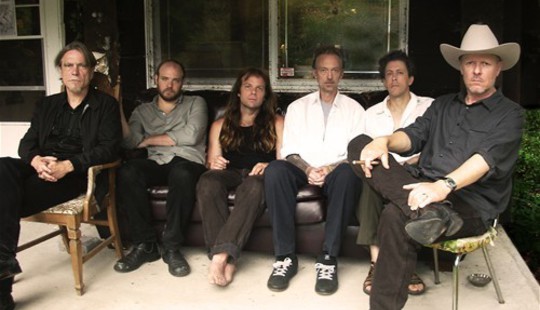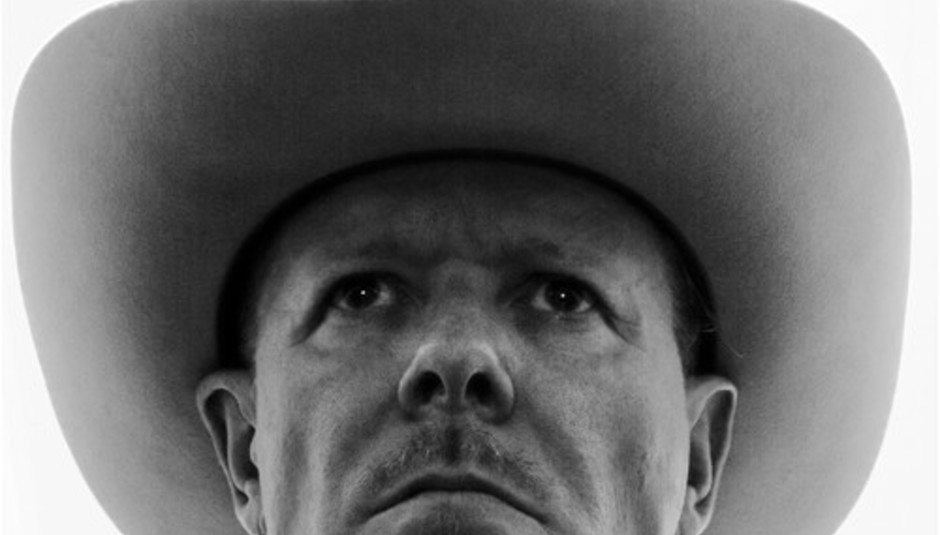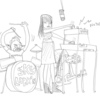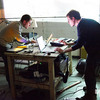With the best will in the world, there are few weekends where Cardiff and Birmingham find themselves tussling for the title of most musically happenin' place in the UK... but that all changes over the next few days as Capsule's Supersonic festival goes head to head with Huw Stephens' Swn. DiS OBVIOUSLY CAN'T TAKE SIDES, but fortunately the most anticipated set at either festival is by Michael Gira's resurrected Swans, who are playing in Cardiff on Saturday night and Birmingham on Sunday. Ahead of these dates and a string of UK shows next week, DiS caught up with the man, the legend, Mr Michael Gira.
One question in and it already feels like Michael Gira is weary of the perceptions of the latest incarnation of Swans. “I would call it a reinvention…”, he pauses again, and I can almost feel his shrug crackling it’s way down the phoneline, “Or an invention. It’s not a reunion, it’s not like we’re getting together and playing the hits from our album or something… It’s taking elements and ways of working that I and my cohort used in Swans, and we’re trying to push it forward, and we’re doing so.”
This emphasis on progress (and accompaning fear of the re-prefix) is food for thought for fans eager to hear Gira re-tread former glories as Swans come to the UK for the first time in nearly 15 years, as well as those excited to hear the band back once more and making new music. Although this interview is carried out between US shows and across many miles, one gets the feeling that even if we were toe to toe and face to face in the same room, you’d still feel distant from Michael Gira and his muscular, drawling baritone. He’s at once admirable and menacing, a sublime type of artist. Like his lyrics, his words tumble out and form meaning only after a few seconds thought, frequently causing unease or disquiet as much as they do wry smiles. About his music, and his relationship with various recording entities, he effortlessly exudes the kind of certainty and depth of thought that marks him out as someone who’s entirely intuitive. He never thinks, he simply does, especially when it comes to music.
I don’t think that way. I just start playing guitar and then find something I like, and then figure out words to it… I guess I’m influenced by my own music more than anything else, I’m just always looking for the thing that was done during the previous recording or incarnation… an element in there that can extend forward, that I can make something new out of. It’s not like one searches around for influences…at least not with me. I’ve been making music a long time, and influences don’t really appear that often anymore.
The formidable logic that informs his position counterbalances the initially arrogant taste of such words. Michael Gira always sounds like Michael Gira, only seemingly more so. Before I’d even heard My Father Will Guide Me Up a Rope to the Sky I could have told you exactly how it would sound: unique in its stomach churning intensity, aggressive in its empassioned nature, at once melodic and dissonant. It sounds like the record you’d expect Gira to make, not only after The Great Annihilator and the Faust-ian (in both senses, arguably) Soundtracks for the Blind, but also after the stripped down feel of Angels of Light, characterised by Gira as his 'rudimentary' phase.
The difference with My Father Will Guide Me Up a Rope to the Sky and perhaps the provider of that all important intensity, is that unlike any of the Angels of Light recordings, where even Akron/Family served as an 'overdub machine', it was recorded as part of a band. Gira is keen to point out that the songs, written over a period of three years, were originally intended as an Angels of Light record, but that he “Reached an impasse with that, it just didn’t seem as invigorating or challenging… I wanted to hear, or be inside of, I should say, a more all-encompassing, atomising sound again. So I just decided to start Swans. And that’s what I did.”
Swans - 'Eden Prison' by theQuietus
It was this kind of feeling that launched Swans in the early Eighties. Fed up with the “staid, elitist and irrelevant” world of art college in LA, and inspired by a bumper show of “quintessential LA punk bands… X, The Screamers, Weirdoes, The Germs” at LA’s feeder punk club The Masque, Gira struck out, first into magazines filled with interviews and “vile art, images and pornography”. In 1979, he found himself in New York, and started eventually started Swans, bringing to an end years of occasionally dangerous wandering as a teenage runaway (most famously, he was arrested for drug possession in Israel and incarcerated there, something I’m understandly reluctant to pry further into, despite the tellingly entitled ‘Eden Prison’ on the new record). He recounts one of his most formative experiences as coming from those years on the run, catching Pink Floyd “before they sucked” on their Ummagamma tour.
I was a runaway in Belgium, in like '68-9, and I saw Pink Floyd at this festival...that was absolutely amazing, really really transporting. I still reference that in the back of my mind when I think about what we do. You don’t hear it really stylistically, but it’s still the same kind of ambition.
It all stems from Gira’s vision of music as something all encompassing: despite his earlier assertion that he rarely strays near a stereo, he comes across as every bit the avid consumer of music. Although he lists The Stooges, along with Throbbing Gristle and Asutralian industrialists SPK, as his prime influences when he began, he credits Brian Eno and the pyschedelic movement as playing an equal role in creating his approach to music and music making. “Different ways of looking at sounds informed the way of working in the early days” he intones, before later coming over all nostalgic (a rare moment for him) about the way albums have changed, the disconnected nature of product and packaging.
I was born in 1954… so when I was 12 or 13 the whole psychedelic thing was starting… the packaging of albums and everything was completely tied in with how you perceived the sound, and I loved that aspect, like how the packaging informs what you’re hearing, and also how the words inform the sound you’re hearing, of course. I love that aspect. I take a lot of the notions I have about music, about music being this sort of all engrossing… something… that just could completely rip your body apart and fly it up to heaven, that to me is almost a sixties pyschedelic kind of notion.
This manifests itself in his position as the graphic designer of all his releases and his developed interest in art, despite his youthful disillusionment with what he saw as a decaying and overly limiting form of expression. He waxs lyrical about the album’s cover, which marks a significant departure from the stark minimalism of Swans' previous album covers, and gives a tantalisingly glimpse of the band’s occasionally vast sound.
The artist whose images were used for this was Beatrice Pedeconi, (www.beatricepedeconi.com) and her art’s amazing. She takes a plexiglass box and fills it with water and then she lights it in a certain way and she puts a 12x12 camera above it and she paints on the water and then takes photographs. She literally paints on the water.
But what really got Gira about her work was not the creative nature of its birth, but the way it represented his perception of himself and his music: “It really struck a chord in me because it’s something very particular and finite but it implies this vastness of space. That’s what I liked about it.”
Despite his artistic ties, he forcefully rejects the notion that Swans formed any part of a cohesive cross genre movement, citing instead the band’s temporal position as part of the “élan of the time”. Back then he was interested in art as extreme as the music he was listening to and creating with Swans, in particular the violent, destructive and graphically indecent work of a disaparate Viennese movement known as aktionismus, who informed the notorious performance artist Chris Burden’s work, best known for his 1974 piece 'Trans-Fixed' in which he crucified himself, forcing nails through his hands and feet, onto the bonnet of a Volkswagen. (Burden also had himself shot through the arm, and prempted David Blaine’s glass box stunt, all in the name of artistic expression).
Thankfully, Gira’s more extreme artistic tendencies manifest themselves a little more tamely than Burden’s, even if the initial reports of Swans as a band brutally obsessed with causing as much aural pain as possible still stick in the minds of listeners old and new. When questioned about the band’s reputation as a destroyer of eardrums and an emptier of stomachs, he counterattacks with an echoing laugh:
See you’re feeding into it right there aren’t you? It wasn’t just that… Swans had an early period where it was pretty relentless and without dynamics, but the music changed considerably over the years, the final years had a lot of dynamics, Of course they had huge never-ending crescendos as well, but there’s lots of subtlety there too.
Yet Gira is still out to unsettle his audience and look at things in a way which he calls "prismatic". He reveals he’s been having the air conditioning in venues turned off to make his audience sweat, not because he wants to create some Dante-esque inferno, but because he wants the audience to thrive in the ritualistic nature of his performances. “I want it to be almost like being in a peyote sweat lodge or something, some kind of ritual”

Swans 2010
On record, this desire to unsettle has manifested itself as the sublimely creepy and bizarrely hopeful 'You Fucking People Make Me Sick', a track constructed around found sounds and drones from the recording process that Gira originally intended to use as a series of transition pieces in the album:
We would record stuff by mistake, like a guitar drone going, or someone going down the metal stairs, like a creaky sound, and I’d take that and save it or. Just things that I thought were gonna be a little transition period on record. And it just kept growing and growing and adding things to it.
But there came a point when Gira realised that his creation had grown larger than life, Frankenstein-like, becoming “a pastiche that grew out of working inside the record”.
And I thought this piece, this sonic thing, there’s an actual song in there. So I wrote this song on acoustic guitar and I was singing it and I was singing it, and me “Oh my god, what do I sound like, what is this, I sound like devendra. So I went shit, I’ll just have Devendra [Banhart] sing it, so I called Devendra and he agreed to sing it.
The song builds from creaking mandolins, and stirs into a musique concrete crescendo, as Banhart, accompanied occasionally (and terrifyingly) by Gira’s young daughter Saoirse, croons a “little murderer’s prayer” about love, want and need. His daughter’s participation, which he magnanimously credits his wife with enabling, isn’t his first use of young voices, which he feels adds an extra layer of pathos to his recordings:
It’s not the first time I’ve recorded a child. On Love of Life we did this track called Identity, and I wrote these rather weighty lyrics and there was just no way I could sing them, so I got a six year old boy to sing them. It makes them more of a prism, rather than something direct.
As for where the lyrics and the title came from, he pauses and croakily laughs in anticipation of what he’s about to say:
I was looking at these music websites, not yours of course, and all these fashionable young people, and I came about wanting to fuck them or kill them or maybe do both simultaneously. And I thought it would be nice to have Devendra sing those sort of words – it’s not really clear, but that was the intent.
Such lyrics and abstract ways of record ensure that even in it’s current, more dynamic and varied form, Swans music remains demanding. Both the pummelling multi-instrumented 'Inside Madeline' and the creaking 'Reeling The Liars In', powered by Gira’s eeriest baritone unsettle in equal measure, reaching out of the record and grabbing the listener by the throat. Part of this, he feels, stems from how the album was recorded.
It took a lot of work. We met up in the studio and we played one song per day, in a really large room, a 2000 sq ft room with 15 ft high ceilings and we set up out equipment in a semi circle there and we just took one song per day and we played it for about 12 hours, until it grew and expanded and found new ways of iterating nuances, and pressed record at the end of that time.
This furthermore manifests itself in the live shows, which Gira relishes. They’re “All-consuming. Overwhelming. Body destroying, body creating”. There’s an undeniable spirituality to Swans' music, even if Gira rejects the notion of anything approaching the adjective religious coming near his music. In one of his leaps of tangential brilliance during the 30-minute interview, he compares his music to tantric sex, savouring the metaphor initially before pursuing it ever deeper. Whhilst the themes of sex (and of course death) are never far from the minds of those listening Gira’s words, perhaps due to that skull-caving baritone, there’s a serious comparison being made with regards to Swans' sound:
It’s like tantric sex. You just keep pushing and pushing and pushing and pushing and tension builds and tension builds and eventually this white light of energy just charges all the electrons in your body and you just lose yourself in something bigger than yourself.
Live, there’s a similar thought, and when Swans bring their iron fisted and velvet gloved punishment to us this weekend, Gira warns us not to expect brevity, or for him to go easy on us:
This music is incredibly demanding to play. Some of the songs are 20 minutes long now, they’ve just grown. The more we play them live the longer and more nuanced they get and have different parts that grow out of them. So it’s very demanding, physically, but it feels great.
As for those who relish the return of Swans as an identikit version of the past, a noiserock time capsule, Gira has only this to say:
They’re just attached to the past, that’s tough really, y’know? If they don’t like it I don’t care, and I mean, it’s just the way it is.
Quite.
Swans play:
October 21 Cyprus Avenue, Cork
October 22 Button Factory, Dublin
October 23 Swn festival, Cardiff
October 24 Supersonic Festival, Birmingham
October 25 Arches, Glasgow
October 28 Koko, London
October 29 Uni Stylus, Leeds
October 30 Academy, Manchester






















